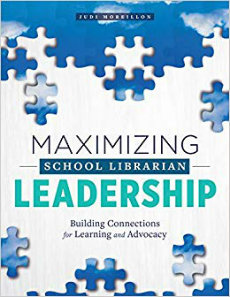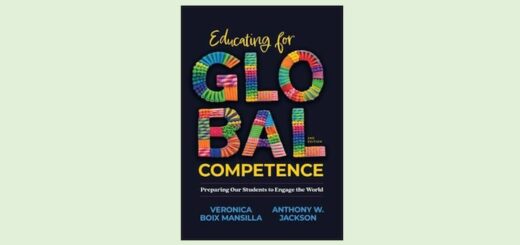Maximize the Leadership of School Librarians
Maximizing School Librarian Leadership: Building Connections for Learning and Advocacy
By Judi Moreillon
(American Library Association, 2018 – Learn more)
 Reviewed by Susan Curtis
Reviewed by Susan Curtis
With commitment and hard work, school librarians can make themselves indispensable to learning in their schools, writes Judi Moreillon in Maximizing School Librarian Leadership. The author looks at the essential elements of good schools – building connections, professional development, inquiry learning, digital resources, assessment, advocacy and more – and explains how librarians can take leadership in supporting all of them.
 In Chapter 1, along with a thorough discussion of education thought leaders’ visions for schools, Moreillon discusses the leadership roles of librarians in school-wide collaboration, including a chart outlining their responsibilities. Among the ways they can provide leadership are through co-teaching, hosting and providing professional development, and serving as co-leaders with principals.
In Chapter 1, along with a thorough discussion of education thought leaders’ visions for schools, Moreillon discusses the leadership roles of librarians in school-wide collaboration, including a chart outlining their responsibilities. Among the ways they can provide leadership are through co-teaching, hosting and providing professional development, and serving as co-leaders with principals.
Hosting PLCs and co-teaching
In Chapter 2, the author recommends promoting the library as a learning commons to support an in-school Professional Learning Community. Basing the PLC in the library facilitates librarians providing PD along with other educators. The chapter also includes ways that librarians in co-teaching roles can benefit students, noting research shows librarian involvement in teaching helps build learning. Instructional partnerships can also strengthen relationships and prove useful in informing the principal of what has worked and of helping to build momentum for successful change.
Chapter 3 provides a fully developed description of inquiry based learning and the Guided Inquiry Design process. Moreillon says that libraries can provide makerspaces and that co-teaching librarians well versed in GID can help advocate for inquiry learning to benefit students.
Traditional literacy learning
In her chapter on traditional literacy learning, the author notes that beyond reading promotion, librarians can be part of improving reading comprehension through co-teaching. Moreillon believes librarians can contribute to better reading, writing, tech use, and inquiry skills, helping students gain background knowledge, understanding of sensory images, and skills in questioning and drawing inferences.
Following a detailed description of deeper learning in Chapter 5, Moreillon covers questioning methods and the value of cross-curricular study. She notes librarians serving as collaborative leaders can support students by helping to design learning experiences and by providing up-to-date access to digital tools through such sources as Open Educational Resources (OER).
Essential participation in digital learning
After an introduction to digital learning in Chapter 6, the author focuses on the role of Future Ready librarians in leading the shift from analog to digital centered learning. In addition to helping students understand digital citizenship, the librarian can offer timely PD to educators. Librarians may find themselves bookmarking Chapter 6 more than any other chapter in the book.
Chapter 7 begins with a very detailed discussion of formative and summative assessment. Serving as co-teachers, librarians can take part in developing rubrics and portfolios, helping students learn to question and reflect. Moreillon also discusses tools and activities for evaluation of librarians and teachers.
Advocating for students and for the library
In Chapter 8 the author looks at advocacy with frequent reference to experts and quotations from their writing. Much of the chapter addresses how librarians can lead successful advocacy efforts to improve learning and teaching via campaigns to expand library resources and address human, digital, and environmental needs. She recommends that librarians become part of school leadership, building a network of support, and developing an advocacy plan. Moreillon includes a detailed advocacy plan as an example.
Sustaining a collaborative learning culture is a challenge, writes the author. In Chapter 9 she outlines ways librarians, teachers, principals, families and communities can work together to empower the learning culture.
Each chapter of Maximizing School Librarian Leadership ends with discussion questions, activities, and reflection prompts. Judi Moreillon is hosting a free, year-long book study of Maximizing School Librarian Leadership. Learn more at her website.
Susan Curtis, co-editor of MiddleWeb, is a librarian and has worked in a public library as well as taught middle grades students and staffed nonprofit organizations.


































